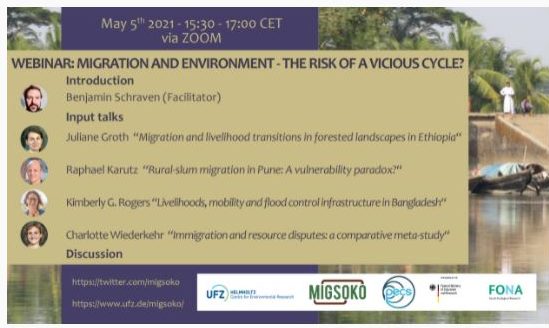WEBINAR: Migration and environment: the risk of a vicious cycle?
On Wednesday, the 5th of May 2021, the PECS project MigSoKo invited to a webinar on the question: ‘Migration and environment: the risk of a vicious cycle?’.

Environmental changes and human migration are interlinked and can potentially reinforce each other. Research on environmental factors influencing migration often focus on the areas of origin. Besides, research on impacts on receiving areas and potentially resulting risks for migrants is underrepresented.
The aim of the webinar ist to contribute to enhancing our understanding of the environment-migration nexus by shedding light on environment-related challenges at migrant hosting areas, which may become out-migration drivers themselves. Deduced, the underlying key question can be stated as ‘under which conditions there is the risk that migration and environment turn into a vicious cycle?’.
The webinar was moderated by Benjamin Schraven, who started the webinar by introducing the topic. Thereafter, the following speakers continued with their input talks about their empirical research:
Firstly, Juliane Groth (Doctoral researcher, MigSoKo, UFZ) displayed results from her fieldwork in Guraferda district with the title “Migration and livelihood transitions in forested landscapes in Ethiopia”. Secondly, Raphael Karutz (Doctoral researcher, FUSE, UFZ) gave insights on migration trajectories and reasons for moving to the Indian city of Pune “Rural-slum migration in Pune: A vulnerability paradox?”. Next, Dr. Kimberly G. Rogers (Assistant professor, Integrated Coastal Programms, ECU) presented “Livelihoods, mobility and flood control infrastructure in Bangladesh” by they example of the Ganges-Brahmaputra-Meghna Delta, India. Charlotte Wiederkehr (Doctoral researcher, MigSoKo, UFZ) then continued by demonstrating insights from a comprehensive meta-study on 20 rural immigration areas in the Global South “Immigration and resource disputes: a comparative meta-study”.
The webinar ended with a vivid discussion integrating questions from the audience.
You can listen to the recording of the webinar here.
Upload by Johanna Hofmann
